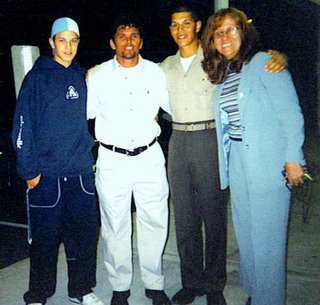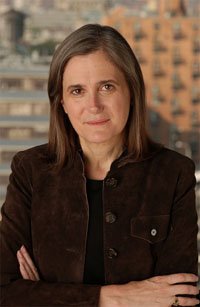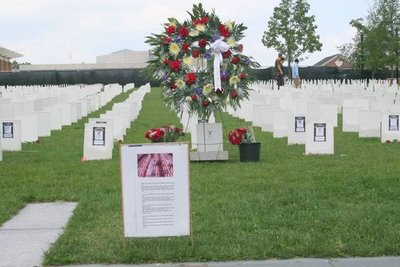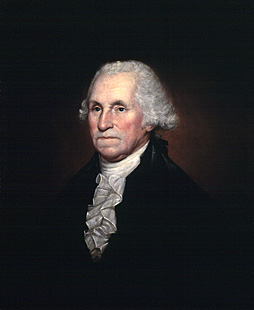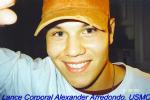Wednesday, September 6th, 2006 Father Recounts Burning Marine Van and Himself After Learning of Son's Death in Iraq For the second year in a row, activists convened in Crawford, Texas this August as President Bush took his late-summer vacation at his ranch. The gathering is called Camp Casey, named for the son of anti-war activist Cindy Sheehan. Casy Sheehan died in Iraq on April 4, 2004. On Tuesday, Camp Casey followed the President back to Washington, D.C. to launch a new protest gathering: Camp Democracy. It's taking place over the next few weeks on the National Mall. In addition to the Iraq war, the event will also focus on other social justice causes at home and abroad. Events will be held around the rights of immigrants, workers, women, voters and victims of Hurricane Katrina. On Friday night, as we began our 80 city-Breaking the Sound Barrier tour, we pulled up to Provincetown Highs School. In front of it stood a man and his wife with a coffin. Hanging off of it was an Army jacket and next to it, were Army boots. It was Carlos Arredondo and his wife Melida. They told me about his son, Alexander, who died two years ago in Najaf, on Carlos' 46th birthday. Carlos will be heading to Camp Democracy later today. - Carlos Arredondo, his son, 20-year-old Marine Lance Cpl. Alexander S. Arredondo, was killed in Najaf on Aug. 25, 2004.
- Melida Arredondo, wife of Carlos Arredondo.
- Read Carlos' account in The Nation
- See photos of Alexander Arredondo and his family
RUSH TRANSCRIPT This transcript is available free of charge. However, donations help us provide closed captioning for the deaf and hard of hearing on our TV broadcast. Thank you for your generous contribution.
Donate - $25, $50, $100, more... AMY GOODMAN: Carlos and Melida join us today from a studio in Boston. We welcome you both to Democracy Now! CARLOS ARREDONDO: Good morning. MELIDA ARREDONDO: Good morning, Amy. AMY GOODMAN: Well, Carlos, you became a national story, horrifying as it is to say that, two years ago, when you learned of your son's death, who was killed August 25th, 2004. Can you talk about that day and where you were? CARLOS ARREDONDO: Yeah. That day was my 46th birthday and -- my 44th birthday. I was in Hollywood, Florida, and I was expecting the phone call from my son Alexander who -- he never missed a call for my birthday, and pretty much I was outside my house, waiting for my wife to come home to celebrate my birthday. My mother was at the house. And the next thing I know, three U.S. Marines, a casualty team, came to my house. And they pretty much parked in front of my house. And for a moment I thought it was a surprise from my son Alex. I thought he was home. And the next thing I know, they are out telling me my son Alexander, Lance Corporal Alexander Arredondo was killed in Iraq, and no scripts for that kind of news. No scripts for that kind of situation. I pretty much spent almost a half-hour asking three different times the U.S. Marine team to leave my house. They never was prepared about the situation. They never asked me to come inside the house. They never supported me or helped me mentally, because I run around the house. I asked three different times to leave my house, and they still not leave my house. My second time that I attempt to leave, I walk out with a hammer, five pound hammer, to pretty much ask them to leave my house, otherwise I’ll destroy their van, and still nothing happened. My third time, almost half-hour later, I asked them to leave my house. And at that time, you know, I walk out with five gallons of gasoline, a propane torch, and I started destroying the U.S. Marine van that was in front of my house with a hammer and destroy everything, threw everything all over the place and poured it with gasoline and then opened the gas -- propane torch, and which the van blew up with myself inside. Luckily I was near the driving side door, which explosion threw me out to the street on fire, and I get 26% of my body burned. And I’m still suffering that consequences, but I've been speaking -- AMY GOODMAN: Your mother had tried to pull you out of the van before it lit, and that set off the torch in your hand? CARLOS ARREDONDO: That's correct. My mother was the whole time, was at the door screaming and yelling for help. And she doesn't speak English, but she was yelling so loud, you know, anybody can -- for the help that she was asking, nobody was around. The Marines was in the same spot the whole time. When I tried to reach the driver's side door, because the fumes of the gasoline was very strong, I cannot breathe, pretty much, that's when my mother reached into my hand and pulled me -- tried to pull me out. That's when I pressed the button which ignited the flames. That's when the explosion occurred. AMY GOODMAN: And at that point -- as we turn to your wife, Melida -- at that point, Melida, you were just pulling up in the car? MELIDA ARREDONDO: That's right. I had just turned the corner to the house, and I saw ahead something on fire, and I was perplexed. And I thought it was a house, and then I approached. I saw was a van. Then I realized the van was in front of my home, and then on the other side of the street I saw my husband with a Marine sitting on top of him, and my husband was burned. AMY GOODMAN: What happened next? MELIDA ARREDONDO: I pulled up. I tried to stop the car right in front, but the Marine said to me, "No, no, no! Go! Go! The van’s going to blow! The van's going to blow!" So I had to drive the car to the corner and then run back, and the van did blow two or three times. And as I approached Carlos, the thing that I noticed the most was his skin. He also had a shirt over his eyes with the Marine on top of him. The shirt was like over his head. And I tried to relax Carlos as much as possible, saying, "Relax, relax. Okay, calm down, calm down." And finally, the Marine let go, and we got the shirt out from over his head, because my husband couldn't really breathe very well between the pressure and the smell of the smoke and everything. He did have some smoke inhalation. And at that point, we were surrounded by helicopters, press, ambulances, fire trucks, neighbors. It became sensational within seconds. My mother-in-law said, "Here, here, the phone. It's Brian. It's Brian." She said it in Spanish. And Brian is my younger stepson, and he was with his mom in Maine during that period. And he asked, “Where is dad?” And I said, “Oh my God, Brian! Oh my God! Turn on the TV! Turn on the TV!” He did. He said, “What's going on? There's dad! There's dad!” It was being shown live in Maine, as it was all around the country. And I'm saying to him, “Yes, your father lost it. He couldn't deal with it, you know. Alex is gone and -- I’m sorry, Brian.” He said, “Well, I --“ Brian was basically almost crying, and he said, "Well, I called to wish dad a happy birthday." AMY GOODMAN: And Brian then was seventeen years old? MELIDA ARREDONDO: At that time, he was sixteen. AMY GOODMAN: Sixteen. We're talking to Melida and Carlos Arredondo. Two years ago, Carlos's son, Melida's stepson, died in Najaf in Iraq. That was two years ago, Carlos. After that, what happened? Did you start speaking out right away? How long did it take you? And how long has it taken you to heal physically? And then we can talk about emotionally. CARLOS ARREDONDO: Well, it pretty much, you know, it took some time, you know, just to deal with the mourning and with Alexander's death and also the issue about me not being an American citizen. I am a legal resident, and so I was trying not to get in trouble with that issue, because I might be deported. At the time when I was in the hospital, I thought I was going to be ended up in Guantanamo, because, you know, I pretty much targeted a U.S. government property. And all that was taken care. I am still speaking out pretty much. Almost a year later, we started speaking out. And when the 2,000 casualty, whose name was Alexander also, that's when pretty much I put together my display that have been going across country, bringing to cities and towns, to Washington, to the Congress and everywhere I can, like asking people have a little bit of feelings about all this nonsense war. AMY GOODMAN: Carlos, before we talk about the coffin that you take around the country, I wanted to go back to this issue of you being legal resident, an immigrant from Costa Rica? CARLOS ARREDONDO: Correct. AMY GOODMAN: Now, you have applied for citizenship but have not gotten it, even after your son died in Iraq? CARLOS ARREDONDO: No, because the reason is everybody got to wait in line. And when I moved from Massachusetts to Hollywood, Florida, I ended up moving my documents to my new state, and so I ended up going to the last of the list -- line. And then when I move back to Massachusetts for my son's burial, also to come back to Massachusetts, my citizenship application ended up being once again in line, in the bottom line of all those applications that are waiting. And at this point, I’m not too sure where my number is right now in that line. AMY GOODMAN: I’m looking at a letter. At Provincetown High School, you had the coffin in the back of a pickup truck. You had the Army jacket, the Army boots of your son Alex, and you have a whole display and a notebook of different letters. Among them is a letter from Alex that he wrote from sea as he was being shipped out to Kuwait, dated January 19th, 2003, right before the invasion. He writes, “I’m not afraid of dying. I’m more afraid of what will happen to all the ones I love if something happens to me.” When did you receive that letter? CARLOS ARREDONDO: Well, we received that letter -- that was his first letter home on the way to war. He was being transported in the Dubuque, this Naval ship that was on the way to Kuwait. And pretty much, as soon as I received that letter, I started sharing that letter to friends and family and people that crossed my way, to let them know if they can support Alex by writing him back, and pretty much I started then sharing these feelings and emotions. MELIDA ARREDONDO: But you ask an interesting question, Amy. Actually -- AMY GOODMAN: Yes, Melida. MELIDA ARREDONDO: There are -- there's a lot of communication blackouts, and at the beginning of the war -- I’m sure we weren't the only anxious family in the United States -- we didn't hear from Alex. So that letter was not the first communication. He wrote it before the war, as he was on the USS Dubuque, but what we actually heard first was Alex's voice on an NPR radio show by John Burnett, and it was totally a coincidence. We were on our way to walk our dogs in a local park, and the radio came in and we were listening because it was about Iraq. And then all of a sudden, John Burnett said, “And here I am with Lance Corporal Alex Arredondo.” Oh, my goodness! That was early March, mid-March. And then the letter arrived late March. AMY GOODMAN: We're going to break. When we come back, I want to ask you about Brian, your younger son, who, as we talked on Friday night in Provincetown, Massachusetts, not that far from Walpole, where you live, you'd said is being aggressively recruited himself, now 19 years old, by the National Guard. We're talking with Melida and Carlos Arredondo. They lost their son two years ago, August 25th, 2004, in Najaf. Carlos heads today to Camp Democracy in Washington, D.C. He will be one of the first people to speak tomorrow on the National Mall. Stay with us. [break] AMY GOODMAN: We're joined in Massachusetts by Carlos and Melida Arredondo, who lost their son Alex, Lance Corporal Alex Arredondo, killed in Najaf, August 25, 2004. Carlos, you have been pulling a coffin, whether in a pickup truck, as I saw you in Provincetown, or across the capital in Washington, D.C., in Waco and Crawford, you just came from -- the coffin that symbolizes the death of your son. Can you talk about this display that you carry and all that you have in it? CARLOS ARREDONDO: Well, I’m trying to honor my son Alexander and trying to do it as personal as I can. I cannot speak up for any other family. But also, I want to remind the American people for all those fallen heroes that we already lost, the American fallen heroes, at the same time, when I speak, I remind people, all the people who have been killed in Iraq, remember them and honor them and do something about this nonsense war. I also want people to understand and remember there is NATO forces. We almost have 250 NATO forces from El Salvador, Australia, England, Spain, you know, all these people who sacrifice their lives, and we need to remember them. And the way I’m going around the country from the west coast to the east coast and letting know people what the situation happened to me in this case, how my son was recruited, how the notification team deal with my situation, and how it's been for ourself. Not all the families in this country, the Gold Star Families speaking out, it's very hard for them to come out and deal with the situation, but in my case, in Massachusetts, we have two families right now speaking out: the Lucey family and Arredondo family right now. We are working very hard to share our story to the American people. We have more than 50 casualties right now in Massachusetts. On Wednesday, we bury one more soldier here at home. Just last night, we lost one more soldier in Iraq from Massachusetts. And this is getting out of hand. And we don't even know the number in Iraq and Afghanistan or the citizens that’s been killed. And my purpose of me traveling around the country is to let know people that we are fighting an immoral war. This administration has been pretty much doing their own thing their own way. And I’m coming from a third world country, Costa Rica. Right there, we have a free care for all. All by selling bananas and coffee, school for all the kids. So I am meeting with senators and congressmen to let them know there is something wrong with our picture, because being from a third world country, we can handle that situation. Why can this country cannot do it? Also, one of the messages I got from people in the Congress, senators and congressmen, is pretty much that we need to draft this up together and let know the American people that we need to vote. 5% of the American people is what we have in the world. And when they make the wrong mistake, everybody in the world pay the big price. And right now, everybody paying the price for this nonsense war. AMY GOODMAN: One of the things you showed me was a letter from the Army National Guard, and I wanted to read an excerpt of it, that came to your son Brian. It begins, “Dear American.” And it starts off by talking about why it's important to be in the National Guard, to serve in situations like Katrina, interestingly enough, where people said the National Guard didn't show up, because they were in Iraq. But it goes on to say, “You could be eligible for an enlistment bonus of up to $20,000 for joining the Army National Guard. What can you do with $20,000? A new car? Pay off credit cards? Help your family? It’s up to you. It’ll be your money, money earned by making a commitment to serve your country. Remember, the decision you make right now will have a huge impact on how the rest of your life turns out.” Melida, I wanted to ask you about this letter and about the recruitment of your younger son, of Brian. MELIDA ARREDONDO: Brian was planning to be a Marine. He always looked to Alex for guidance and wanted to follow his big brother's footsteps. Obviously, with losing Alex, he's really questioned that decision. At this point, Brian has not continued with high school yet. He has not completed it. However, the military has changed the rules, and you do not have to have a high school diploma or a GED anymore. You can earn it by going into the military and getting it after a period of time. However, Brian and I and his dad and everybody who knows him has spoken to him long about this. And one of the things that I pointed out to him is, Alex trusted his brothers-in-arms and Uncle Sam to take really good care of him. Alex did everything right. And still, he was killed. Alex was killed by a shot to the left temple. It calls to question -- he did have his helmet on. It calls to question the adequacy of the gear that he had on. And that really got Brian thinking, along with all the other conversations that people -- he had with other people. Brian tells me that he's received items from recruiters in malls, on the streets. He has hats, backpacks, lighters. They have gone all out in their marketing, and Brian pretty much has a pretty big collection of items that have been given to him to try to get him interested. AMY GOODMAN: Let me ask you about Brian. Carlos, how would you feel if he decided to enlist? CARLOS ARREDONDO: Well, it’s a lot that covers Brian from not to go there, but doesn't mean he cannot join if he want to. Of course, if he want to, I’m just going to try to do my best for him not to go. And pretty much, I’m telling him he know what we doing. I also, you know, am telling him the tactics the government was using on young girls and kids to pretty much seduce them. They say “volunteer, volunteer,” but I call it “seducing.” They seduce them with all these gizmos and all these offers of money and all that. They are walking around high schools, and everybody know how the tactics are, pretty much. And pretty much, I’m telling Brian how they pretty much have been targeting now the immigrants. You know, the immigrants right now has been offered that kind of money and also the citizenship. And we already have a big amount, a number of immigrants who are fighting right now in Iraq for the citizenship. So, me helping Brian by giving this information, I just hope he not to go there. But if he feels the need for him to go there, as a father, I will support him all the way, and God protect him and myself. And I just hope for him to make the right choice and not to go. AMY GOODMAN: Melida, how is Brian doing? He's 19 now, lost his role model, his big brother. MELIDA ARREDONDO: Brian, himself, says, you know, “I’m bored.” Bored equals depressed. He's had a hard time holding a job, and he hangs out on the block, as I call it, with his pals or whatever. Last week I was with him and a friend, and his friend has taken the ASVAB, which is the exam to go into the military. And that has me concerned, because now his friends are his role models. Brian has told Carlos that he does not want to go in, because he doesn't want to see the same thing happen to his family that happened, you know, when Alex was killed. However, you know, he's at an age where his friends mean a lot to him. And finding out that this friend was interested in going into the Army did not make me feel as good about it as previously. AMY GOODMAN: You live in Walpole, Massachusetts. It's known for the big prison there. MELIDA ARREDONDO: Actually, we live in Roslindale, but that's where Alex is buried. AMY GOODMAN: When I spoke to you on Friday night, you talked about your concerns about the options for young people, particularly young people of color right now. MELIDA ARREDONDO: Yeah. The block, as we call it -- I live in Dorchester. I work in Roslindale. It's a part of the city of Boston. Brian is basically hanging out in different parts of town. And there's been a lot of violence this year in the city of Boston and outlying areas. Unfortunately, Boston now has been cast as a high place for crime. There were seven murders in seven days in the city of Boston, right in the vicinity of where I work and where my family and I often are together doing different events. And it has us all concerned. Brian and Alex both have always said, “Don't worry, don't worry. We'll be fine, we'll be fine.” There's no way we can't worry about this. I believe that -- not just believe, but we know that there are three things that recruiters look for: people are who are low-income, people of Hispanic dissent, and people who come from single female-headed households. I found out this information with my husband from the GAO website after Alex was killed. AMY GOODMAN: We're going to have to leave it there. But I want to thank you both very much for joining us. We will certainly continue to follow events at Camp Democracy, Carlos, where you’re headed today, speaking out there tomorrow. Carlos and Melida Arredondo, I want to thank you very much for joining us and condolences on the death of your son, on the death of Marine Lance Corporal Alexander S. Arredondo, who died on August 25, 2004, Carlos's 46th birthday. He died at the age of 20 years and 20 days. To purchase an audio or video copy of this entire program, click here for our new online ordering or call 1 (888) 999-3877. |
